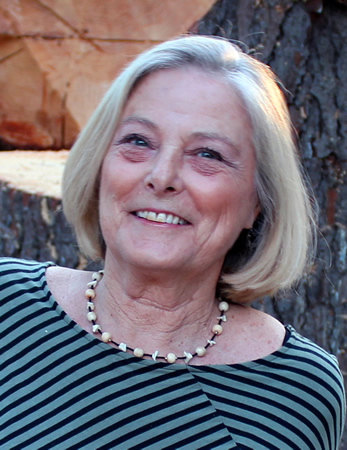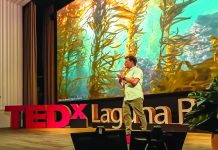By Donna Furey | LB Indy
When Katie Lang was 17 she learned that her dad spent his boyhood in Meiningen, Germany. Luckily for her father, Fred Lang, relatives in the U.S. paid for his fare to leave his homeland in 1934 as Jews then were forbidden from taking money out of the country. He was 19. About a decade later, his mother arrived in Laguna Beach, too.
Thus began Lang’s fascination with Holocaust history and what decades later would become a labor of love and a first novel.
Lang’s teen years growing up in Laguna Beach were focused around reading, drawing and long days at the beach. Her father, the noted landscape architect, was on a team that designed the grounds of UC Irvine. His work was featured in Sunset magazine and he was a founding member of the Laguna Greenbelt. Frederick M. Lang Park at Wesley Drive and South Coast Highway was named for him.

As a girl, she remembered hearing stories from her grandmother about her dad’s youngest brother, Herman Lang, but she didn’t meet him until she was 25.
College took Lang to Los Angeles where she studied art and English at UCLA and then to Mexico City for graduate work in art and education at the University of the Americas. She would eventually teach art and English at a Garden Grove intermediate school.
It was after her first year of teaching that Lang finally met her Uncle Herman when she packed up a Volkswagen van and drove to the east coast, visiting him and his family in Long Island. “I had an instant rapport with Herman,” Lang recalled of that initial visit, where she heard firsthand accounts of a tale that would became “Immigrant Story.”
In the novel, Herman Lang’s journey began in 1938 on Kristallnacht or “night of the broken glass” when he saw two Nazi troopers seize and beat his cousin Fritz. The escalation of beatings, imprisonment, and other terror tactics against Jews was a turning point for him and many other German Jews. He had been stripped of his passport and lost most of his rights. A friend of the Lang family, who had became the police chief where Herman Lang lived, helped him complete the necessary paperwork that allowed him to immigrate to New York.
Katie Lang remembers her father recounting that he had saved a boyhood friend from drowning in Germany. It was the police chief’s son.
In the intervening years, Lang took an extended journey also, joining Tom Slattery, who she wed in 1968, on a two-year adventure across two continents and a dozen countries. Returning home to Laguna, the couple raised a daughter and a son, but divorced more than a decade ago. Lang-Slattery briefly ran a cooking school for Coast Hardware and returned to writing fiction and nonfiction for youth, but remained fascinated with her uncle’s World War II stories and began taping his conversations in 1991.
Over time, she knew she had found a fascinating untold story of Jewish refugees who became silent heroes, but Lang would spend more than a decade researching, interviewing WWII veterans and turning the true story of her uncle’s life into a manuscript.
Along the way, she visited the U.S. Army Military History Institute in Carlisle, Penn., and the National Archives in College Park, Md., document depositories that offered treasures of information. Among the countless books she consulted was one about General George Patton, written in 1947 by Col. Robert S. Allen.
Allen was the commanding officer of an Army Military Intelligence Training Center at Camp Ritchie, Md., where drafted immigrant Herman Lang, 21, was secretly ordered to report. Lang along with other German refugees were well suited for intelligence work and served as interrogators, translators, in reconnaissance and map analysis.
“Research is like a treasure hunt and there is always the chance to discover a precious nugget of information,” said Lang-Slattery.
She initially wrote a manuscript about her uncle’s story for youth audiences, but after rejection notices piled up she heeded the suggestion of an agent to recast the work for the adult market.
The author thinks “Immigrant Story” adds a distinctive voice to Holocaust literature. “The young Jewish hero is not a victim, but a young man who gradually grows from a frightened and frustrated teenager, looking for a place to belong, into a confident U.S. Army intelligence officer who struggles with the conflicting emotions of hate and forgiveness.”
Lang-Slattery signs her new novel, “Immigrant Soldier, the Story of a Ritchie Boy,” at 4 p.m. on Sunday, March 1, at Laguna Beach Books.
Correction appended Feb. 28:
In the article titled Author’s Research Unearths a Family Treasure , in the Feb. 27 edition, the subject of the story learns that her father’s Jewish heritage had been kept secret not her family’s German lineage. Further, his relatives did not pay for passage to the United States, but instead vouched that they would support him, thus making it possible for him to obtain a visa.
Due to an editing error, Col. Robert S. Allen was inaccurately identified. He was Herman Lang’s superior officer at Gen. George Patton’s headquarters in Europe, not at Camp Ritchie, Md., where Lang served.





[…] Read More […]